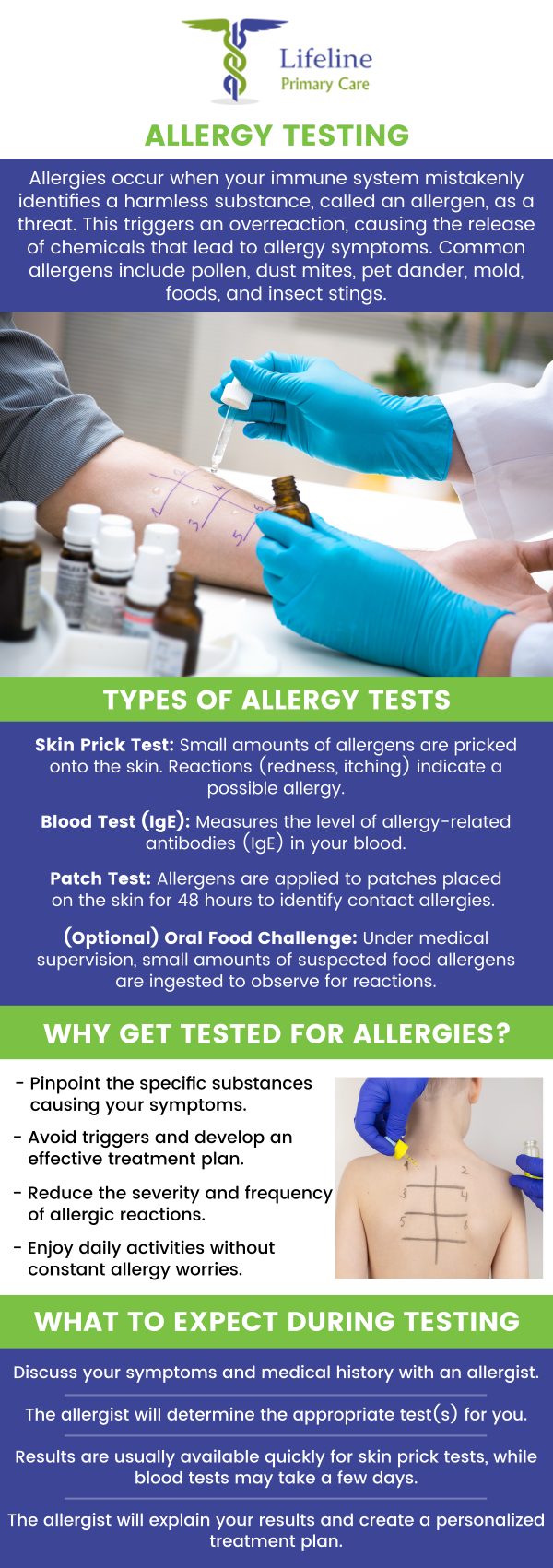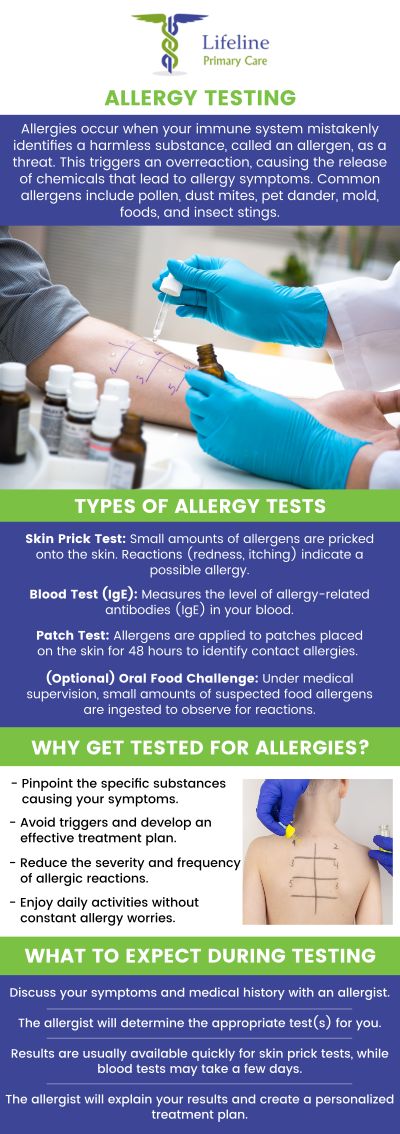Allergy Testing Clinic in Lilburn, GA
Allergy testing is a diagnostic tool used to identify specific allergens—substances like pollen, pet dander, or certain foods—that trigger an allergic reaction. Our experienced providers use accurate testing methods to give you clear results, so you can manage your symptoms and improve your well-being. For more information, contact us or request an appointment online. We have convenient locations to serve you in Lilburn Main GA, Lilburn Extension GA, Lilburn – Snellville GA, Sandy Springs GA, Stone Mountain GA, Duluth GA, Clarkston GA, Suwanee GA, and Norcross GA.


Table of Contents:
What types of allergies can be tested through allergy testing?
How should I prepare for an allergy test?
Are allergy tests painful or uncomfortable?
What should I do if I test positive for an allergy?
At Lifeline Primary Care, we offer comprehensive allergy testing for both children and adults to help identify a wide range of allergies and guide personalized treatment plans. Some of the most common allergy categories, including:
Environmental or Inhalant Allergies
We frequently assess sensitivities to airborne substances such as pollen from grasses, trees, and weeds, as well as mold spores, dust mites, and pet dander from cats and dogs. These allergies can cause symptoms like sneezing, nasal congestion, itchy eyes, and more.
Food Allergies
Our practice also evaluates reactions to common foods, including peanuts, tree nuts, milk, eggs, soy, wheat, fish, and shellfish. Identifying specific food allergies is crucial for managing dietary choices and preventing severe reactions.
Insect Sting and Bite Allergies
If you or your child has experienced unusual reactions to insect stings or bites from bees, wasps, hornets, or fire ants, our allergy testing can help pinpoint the cause and inform your care plan.
Medication Allergies
We can assess allergies to medications, most commonly antibiotics like penicillin, as well as certain pain relievers and other drugs. Knowing your medication allergies is essential for your safety during treatment.
Latex Allergies
For patients with suspected sensitivity to latex—found in numerous household and medical products—we offer targeted testing to confirm and address these allergies.
At Lifeline Primary Care, we tailor our testing to your unique medical history, symptoms, and potential exposures. Depending on your needs, we may use skin prick tests, blood tests, or patch tests to accurately determine what substances are triggering your allergic responses. Our goal is to help you identify your allergies and develop an effective management plan so you can live a healthier, more comfortable life.
At Lifeline Primary Care, we want your allergy testing experience to be as comfortable and effective as possible. Proper preparation helps ensure accurate results and keeps you safe throughout the process. Here’s what you need to know before your appointment:
1. Medication Review:
Before your visit, please inform your provider about all prescription medications, over-the-counter drugs, and supplements you are currently taking. Certain medications—including antihistamines, some antidepressants, and specific heartburn medications—can affect allergy test results by suppressing allergic reactions.
2. Recent Health Changes:
Let us know about any recent illnesses, infections, or skin conditions, as these may impact your allergy test or require us to reschedule for your safety and the accuracy of your results.
3. Day-of-Test Guidelines:
Wear comfortable clothing that allows easy access to your arms or back, as skin testing is usually performed in these areas.
Avoid applying lotions, perfumes, or creams to the areas that may be tested, as these products can interfere with the results.
Unless your Lifeline Primary Care provider gives you different instructions, you may eat as you normally would before your appointment.
4. Your Comfort and Convenience:
To streamline your visit, consider arriving a few minutes early to complete any necessary paperwork and discuss any final questions or concerns with your provider. If you feel anxious about the allergy test, please let us know—our team is here to support you and can offer reassurance or guidance to help you feel at ease.
5. Follow Instructions Closely:
Carefully following the instructions provided by your provider is the best way to ensure that your allergy test delivers the most accurate and helpful results.
Allergy tests are generally not painful, but some may cause mild discomfort. There are two common types of allergy tests: skin tests and blood tests.
In a skin test, small amounts of allergens are applied to the skin, usually on the forearm or back. For a prick test, a tiny needle pricks the skin to introduce the allergen. While this may cause a brief, mild sting, it is not considered painful. Some people may experience slight redness, swelling, or itching at the test site, but these symptoms are usually temporary and go away quickly.
In a blood test, a small sample of blood is drawn to check for allergic reactions. This may cause a slight pinch or discomfort, similar to any routine blood draw.
Overall, the discomfort from allergy testing is minimal and temporary. If you have concerns about pain or discomfort, it’s best to discuss them with your healthcare provider, who can explain the procedure in more detail and address any questions you may have.
If you test positive for an allergy, taking a proactive approach to your health is essential. At Lifeline Primary Care, our dedicated providers are here to help you understand your allergy results and guide you every step of the way. Our team will review your test results with you, discuss what specifically triggered your allergic reaction, and help you understand the severity of your allergy.
We will collaborate to create a personalized treatment plan designed specifically for your needs. This may include strategies to avoid allergens, prescription medications, or allergy immunotherapy, depending on your situation. Our providers will teach you how to recognize and steer clear of your specific allergens—whether that means reading food labels carefully, making environmental adjustments at home, or educating friends, family, and coworkers about your allergy.
For patients with severe allergies, Lifeline Primary Care may recommend carrying emergency medications, such as antihistamines or an epinephrine auto-injector, to be prepared in case of an unexpected reaction.
Keeping a record of your symptoms and any situations that trigger allergic reactions can be very helpful. Bring this information to your appointments so we can work together to fine-tune your allergy management plan. If you notice any new or worsening symptoms, please contact us right away for further evaluation and support.
Our goal at Lifeline Primary Care is to keep you informed, prepared, and empowered to manage your allergies effectively, so you can enjoy the best possible quality of life. For more information, contact us or request an appointment online. We serve patients from Lilburn Main GA, Lilburn Extension GA, Lilburn – Snellville GA, Sandy Springs GA, Stone Mountain GA, Duluth GA, Clarkston GA, Suwanee GA, Norcross GA, Tucker GA, Alpharetta GA, Sugar Hill GA, Scottdale GA, Decatur GA, Doraville GA, Dunwoody GA, Roswell GA, Chamblee GA, Redan GA, Gresham Park GA, Johns Creek GA, Buford GA, and surrounding cities.
Check Out Our 5 Star Reviews


Additional Services You May Need
• Sports Physical Exam
• School Physical Exam
• X-Ray
• Foreign Body Removal
• Minor Surgeries
• Confidential STD Screening
• Allergy Testing
• Immigration Physical Exams
• IUD Insertion
• DOT Physical Exam
• Knee Gel Injections
• Chronic Care Management
• Women’s Health
• Vitamin B12 Injections
• Myers Cocktail IV Therapy
• Weight Management
• Suturing Clinic
• Incision and Drainage
• Dermatological Procedures
• Skin Tag Removal
• Toenail Removal
• Biopsies
• Lab Services
• Lead Screening
• TB Screening
• Hearing/Vision Test
• EKG Services
• Spirometry Testing
• Echocardiograms
• Ultrasounds
• ABI (Circulation Test)
• Urine Drug Testing
• Nerve Conduction Studies
• Annual Physicals
• Immunotherapy
• Neuro Scans
• Employment Physicals
• Medicare Wellness Exams
• VAT/ENG Studies
• Autonomic Nervous System Scans
• Nuclear Scans
• Acute Care
• Smoking Cessation
• Immunizations
• Joint Injections
• Vaccinations
• Covid-19 Vaccines
• Nexplanon
• Primary Care

Additional Services
You May Need
• Sports Physical Exam
• School Physical Exam
• Primary Care
• X-Ray
• Foreign Body Removal
• Minor Surgeries
• Confidential STD Screening
• Allergy Testing
• Immigration Physical Exams
• IUD Insertion
• DOT Physical Exam
• Knee Gel Injections
• Chronic Care Management
• Women’s Health
• Vitamin B12 Injections
• Myers Cocktail IV Therapy
• Weight Management
• Suturing Clinic
• Incision and Drainage
• Dermatological Procedures
• Skin Tag Removal
• Toenail Removal
• Biopsies
• Lab Services
• Lead Screening
• TB Screening
• Hearing/Vision Test
• EKG Services
• Spirometry Testing
• Echocardiograms
• Ultrasounds
• ABI (Circulation Test)
• Urine Drug Testing
• Nerve Conduction Studies
• Annual Physicals
• Immunotherapy
• Neuro Scans
• Employment Physicals
• Medicare Wellness Exams
• VAT/ENG Studies
• Autonomic Nervous System Scans
• Nuclear Scans
• Acute Care
• Smoking Cessation
• Immunizations
• Joint Injections
• Vaccinations
• Covid-19 Vaccines
• Nexplanon




